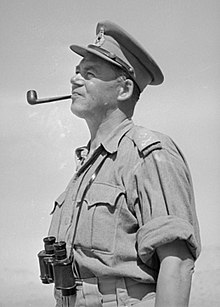Lindsay Merritt Inglis | |
|---|---|
 Lindsay Inglis, pictured here when he was acting commander of the 2nd New Zealand Division, 1942. | |
| Born | 16 May 1894 Mosgiel, Otago, New Zealand |
| Died | 17 March 1966 (aged 71) Hamilton, Waikato, New Zealand |
| Allegiance | New Zealand |
| Service | New Zealand Military Forces |
| Years of service | 1915–1936 1939–1950 |
| Rank | Major-General |
| Service number | 9495 |
| Commands | 2nd New Zealand Division 4th Infantry Brigade 9th Infantry Brigade 27th Machine-Gun Battalion 3rd Infantry Brigade 1st Battalion, Canterbury Regiment |
| Battles / wars | |
| Awards | Companion of the Order of the Bath Commander of the Order of the British Empire Distinguished Service Order & Bar Military Cross Efficiency Decoration War Cross (Greece)[1] |
| Other work | Magistrate |
Major-General Lindsay Merritt Inglis, CB, CBE, DSO & Bar, MC, ED (16 May 1894 – 17 March 1966) was a New Zealand military officer, lawyer and magistrate. Born in Mosgiel, he volunteered for service in the New Zealand Expeditionary Force during World War I. Inglis served on the Western Front and was awarded the Military Cross for his actions during the Battle of Flers-Courcelette. He ended the war as a company commander and returned to New Zealand in 1919.
In civilian life, Inglis worked as a solicitor and barrister in Timaru and also served in the Territorial Force. He re-enlisted in the New Zealand Army during World War II and commanded the 4th Infantry Brigade in Allied campaigns in Crete and North Africa. Inglis had two periods in command of the 2nd New Zealand Division. After the war, he was appointed to a military court of the Allied Control Commission, which administered Allied-occupied Germany. He later served as chief judge of the Allied Control Commission's Supreme Court from 1947 to 1950.
- ^ "No. 35519". The London Gazette. 7 April 1942. p. 1595.